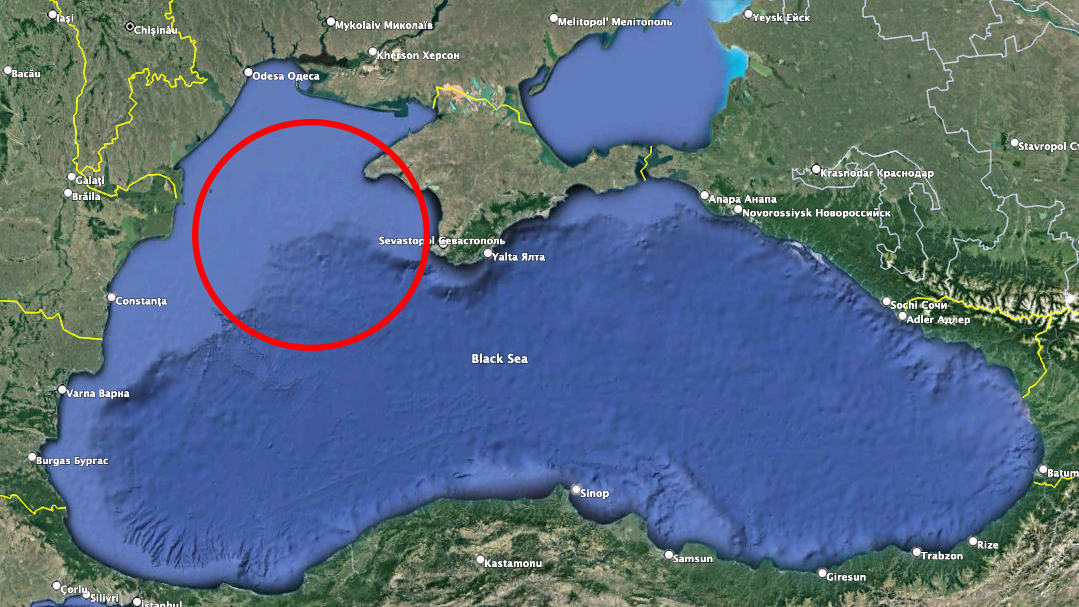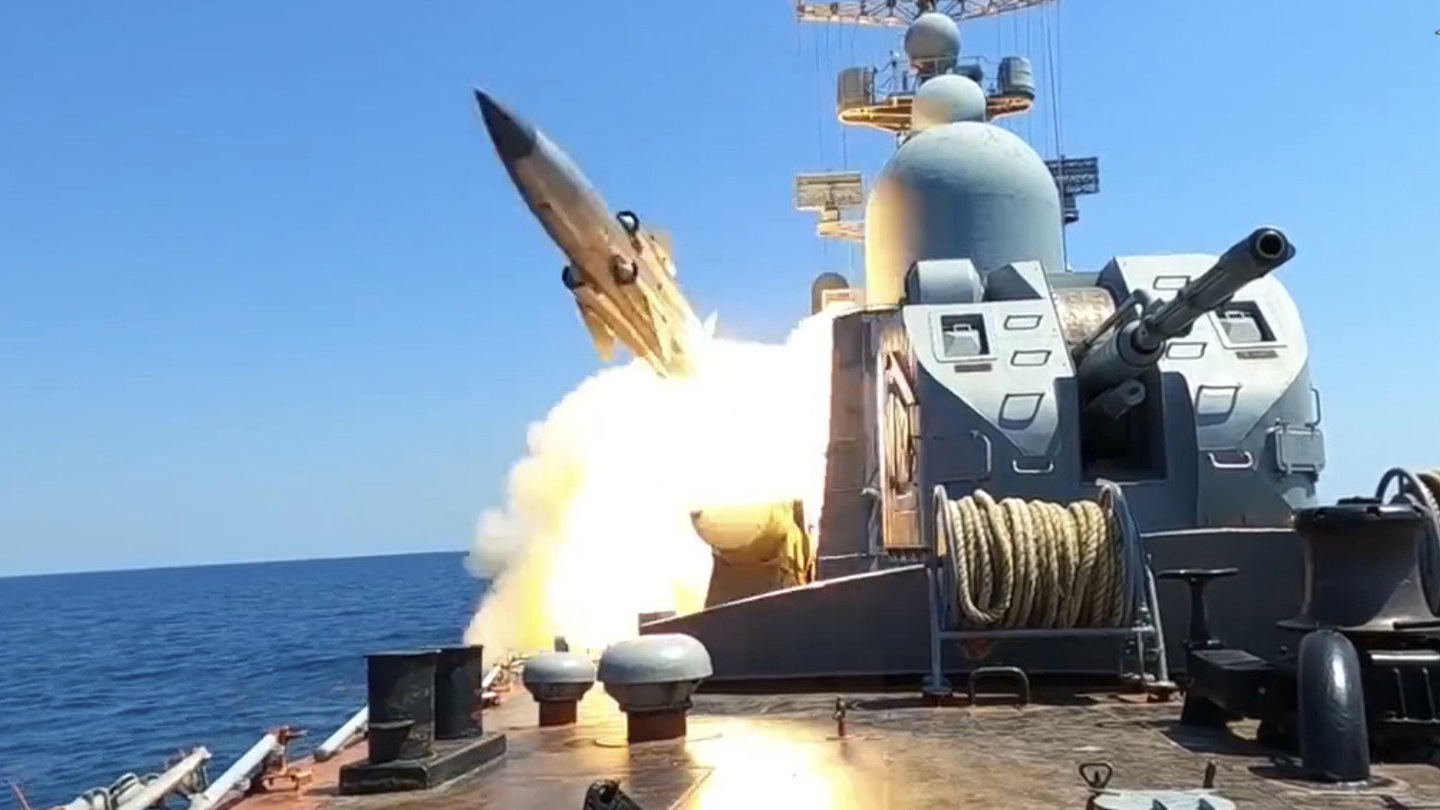Days after Russia issued a warning against vessels sailing to Ukrainian Black Sea ports, the Russian Navy’s Black Sea Fleet conducted live-fire drills in that body of water, sinking a vessel it captured from Ukraine in 2014.
The Tarantul-III class missile corvette Ivanovets “carried out live firing of anti-ship cruise missiles at a target ship” in a combat training rage in the northwestern part of the Black Sea, the Russian Defense Ministry (MoD) said Friday on its Telegram channel.
The ship reportedly fired P-270 Moskit supersonic anti-ship missiles, whose NATO reporting name is the SS-N-22 Sunburn. They have conventional and nuclear warhead capacity, are capable of flying at a speed three times the speed of sound and have a range of around 75 miles. The missiles were aimed at the corvette Ternopil, according to the Ukrainian OperativnoZSU Telegram channel. The Ternopil, once one of Ukraine’s most capable warships, was captured by Russia when it seized Crimea in 2014. The Russian MoD released video showing the missiles being launched, then the target vessel exploding. The target was destroyed, according to the Russian MoD.
“In the course of the joint exercise, the Fleet’s ships and aviation practiced isolating an area temporarily closed to navigation and also carried out a set of measures to apprehend a mock intruder ship,” according to the MoD.

In addition to sinking the ship, the Russians demonstrated interdiction training.
“In the course of the joint exercise, the Fleet’s ships and aviation practiced isolating an area temporarily closed to navigation and also carried out a set of measures to apprehend a mock intruder ship,” the Russian MoD said.
There can be no doubt that the Black Sea Fleet can turn the entirety of its namesake body of water into a super anti-ship missile engagement zone. These weapons, various in type and abilities, are packed aboard much of the fleet, from small fast patrol vessels to frigates. In addition, air-launched anti-ship cruise missiles are an equal threat, as are shore-based coastal defense systems which employ similar weapons. Russia has a lopsided advantage in this regard regionally to almost a stunning degree. In other words, the sample threat shown in this propaganda exercise is very real.
The drills come as tensions in the Black Sea have boiled over in the wake of a suspected Ukrainian uncrewed surface vessel attack on the Kerch Bridge Sunday.
Russia subsequently withdrew from the Black Sea Grain Initiative, though the Kremlin has denied a connection. Then it began striking Odesa and Mykolaiv with missiles and drones. Russia claims these barrages, now on the fourth day, are aimed at legitimate military targets like USV factories and fuel storage sites. Ukraine, however, says grain storage facilities and other civilian targets have been hit, causing several deaths and the loss of 60,000 tons of grain. On Thursday, Ukraine issued a warning of its own about Black Sea shipping.
On Friday, White House National Security Council spokesman John Kirby reiterated the Biden administration’s position that Russia may be planning a so-called “false-flag” attack in the Black Sea.
“We do have information that the Russians are potentially going to try to attack ships – civilian ships – in the Black Sea that could be used for carrying grain out of Ukraine,” Kirby told CNN.
Kirby said the White House has information that Russia could use sea mines or USVs “to attack ships at sea. And we’ve already seen them post a video of them detecting and detonating what they’re claiming was a Ukrainian mine.”
That, said Kirby, “is classic Russia propaganda, classic opportunity by them to plant a false flag to justify – which of course there would not be any justification – but to justify military action against civilian shipping.”
On Friday, Turkish President Tayyip Erdogan said his planned talks with Russian President Vladimir Putin could lead to restoration of the grain deal, according to Reuters. He asked Western countries to consider Russia’s demands.
“The termination of the Black Sea grain deal will have a series of consequences, ranging from the increase in global food prices to scarcity in certain regions and, potentially, leading to new waves of migration,” Erdogan told reporters on a flight returning from a trip to Gulf countries and northern Cyprus.
Moscow says it will return to the deal only if its demands are met for easier access for its own food and fertilizer exports to world markets, Reuters reported. Western countries say Russia has had no trouble selling food, which is exempt from financial sanctions.
Whether Erdogan, who has inched away from Moscow in recent weeks, is able to get Russia to return to the grain deal and back down from its naval threats in the Black Sea, remains to be seen.
Similarly, what Ukraine does with its warning to shipping approaching Russian or Russian-held ports as well as the Kerch Strait, bears close watching.
We will certainly be monitoring this and provide updates when warranted.
Contact the author: howard@thewarzone.com
